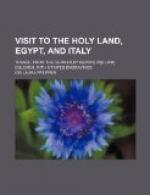Smyrna is, however, not only celebrated as possessing the loveliest women, but also as the birthplace of one of the greatest men. {85} O Homer, in the Greece of to-day thou wouldst find no materials for thine immortal Iliad!
At five o’clock in the afternoon we quitted the harbour of Smyrna. In this direction the town is seen to much greater advantage after we have advanced a mile than when we approach it from Constantinople; for now the Turks’ town lies spread in all its magnitude before us, whereas on the other side it is half hidden by the Franks’ quarter.
The sea ran high, and adverse winds checked the speed of our good ship; but I am thankful to say that, except when the gale is very strong, it does not affect my health. I felt perfectly well, and stood enjoying the aspect of the waves as they came dancing towards our vessel. In Smyrna our company had been augmented by the arrival of a few more Franks.
May 21st.
Yesterday evening and all this day we have been sailing among islands. The principal of these were Scio, Samos, and Cos, and even these form a desolate picture of bare, inhospitable mountains and desert regions. On the island of Cos alone we saw a neat town, with strong fortifications.
May 22d.
This morning, shortly after five o’clock, we ran into the superb harbour of Rhodes. Here, for the first time, I obtained a correct notion of a harbour. That of Rhodes is shut in on all sides by walls and masses of rock, leaving only a gap of a hundred and fifty to two hundred paces in width for the ships to enter. Here every vessel can lie in perfect safety, be the sea outside the bar as stormy as it may; the only drawback is, that the entering of this harbour, a task of some difficulty in calm weather, becomes totally impracticable during a storm. A round tower stands as a protection on either side of the entrance to the harbour. The venerable church of St. John and the palace of the Komthur can be distinguished towering high above the houses and fortifications.
Our captain imparted to us the pleasant intelligence that we might spend the hours between this and three o’clock in the afternoon on shore. Our ship had for some time lain surrounded by little boats, and so we lost no time in being conveyed to the land. The first thing we did on reaching it was to ask questions concerning the ancient site of the celebrated Colossus. But we could gain no information, as neither our books nor the people here could point out the place to us with certainty; so we left the coast, to make up for the disappointment by exploring the ancient city.
Rhodes is surrounded with three rows of strong fortifications. We passed over three drawbridges before entering the town. We were quite surprised to see the beautiful streets, the well-kept houses, and the excellent pavement. The principal street, containing the houses of the ancient Knights of St. John, is very broad, with buildings so massively constructed of stone as almost to resemble fortresses. Heraldic bearings, with dates carved in stone, grace many of the Gothic gateways. The French shield, with the three lilies and the date 1402, occurs most frequently. On the highest point in the city are built the church of St. John and the house of the governor.




